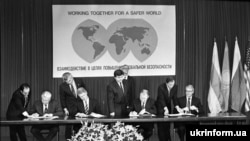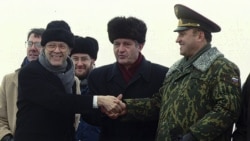In his State of the Union speech on March 1, President Joe Biden criticized Russian President Vladimir Putin for starting a "premeditated and unprovoked war" against Ukraine, and he highlighted the unity of Western countries behind sanctions against Russia.
“We are inflicting pain on Russia and supporting the people of Ukraine,” Biden said. “Putin is now isolated from the world more than ever.”
The next day, China’s state-run CGTN's opinion column “First Voice” published a rejoinder accusing the United States of ignoring “its commitments to allies and friends.”
“[I]n the Budapest Memorandum of 1994, the U.S. offered security guarantees to Ukraine in exchange for the country giving up its nuclear arsenal,” the column stated.
“…When push came to shove, the U.S. ignored this commitment, and emphasized that Ukraine was not an official NATO member and therefore was on its own — without nuclear weapons to defend itself.”
That characterization is false, but it fits with China’s decision to refuse condemning Russia’s war in Ukraine or to correctly call it an “invasion.”
The Budapest Memorandum did not offer Ukraine legally-binding “security guarantees,” but rather “security assurances.” When the Soviet Union collapsed in 1991, some 1,900 strategic nuclear warheads – then the world’s third-largest nuclear arsenal – were left on Ukrainian soil.
After lengthy and complicated negotiations, Ukraine, Russia and the United States reached an agreement in December 1994 known as the Budapest Memorandum on Security Assurances.
Under its terms, Ukraine agreed to turn over its nuclear warheads and join the Nuclear Nonproliferation Treaty (NPT) as a non-nuclear state. In exchange, Ukraine received security assurances from the signatories – Russia, the United States, and the United Kingdom.
But unlike the NATO charter or NPT, the agreement is not a legally binding treaty that comes with an enforcement mechanism. It offers assurances, not guarantees, that is, not specific promises made in response to specific scenarios such as an invasion.
In the memorandum, the signatories “reaffirmed” five points:
· “[T]o respect the independence and sovereignty and the existing borders of Ukraine;”
· “[T]o refrain from the threat or use of force against the territorial integrity or political independence of Ukraine…;”
· “[T]o refrain from economic coercion” against Ukraine;
· “[T]o seek immediate United Nations Security Council action to provide assistance to Ukraine…if Ukraine should become a victim of an act of aggression or an object of a threat of aggression in which nuclear weapons are used;”
· “[N]ot to use nuclear weapons against” Ukraine.
The United States did not violate or “ignore” any of the five commitments it reaffirmed in the memorandum. But Russia has.
Russia repeatedly violated the commitments a) when it annexed Crimea in 2014; b) when it escalated a proxy war in eastern Ukraine by backing pro-Russian separatists in Donetsk and Luhansk provinces; and c) with its full-scale invasion and placement of nuclear forces “on high alert.”
However, while scolding the U.S. with a distortion of history, China has not condemned Russia for any of the Kremlin's obvious violations of the security assurances and inflicting civilian carnage across Ukraine.
Former U.S. Ambassador to Ukraine Steven Pifer, who participated in the Budapest Memorandum negotiations, wrote in an article for the Brookings Institution in 2019 that “when negotiating the security assurances, U.S. officials told their Ukrainian counterparts that, were Russia to violate them, the United States would take a strong interest and respond.”
“Washington did not promise unlimited support,” Pifer added. “The Budapest Memorandum contains security ‘assurances,’ not ‘guarantees.’ Guarantees would have implied a commitment of American military force, which NATO members have. U.S. officials made clear that was not on offer.”
The memorandum itself does not specify what any response should be.
Why didn’t the U.S. and Ukrainian officials then discuss in detail how Washington might respond in the event of a Russian violation? According to Pifer, it “owed in part to then-Russian President Boris Yeltsin” who “insisted that there be no revision of the boundaries separating the states that emerged from the Soviet collapse.”
“Yeltsin respected Ukraine’s independence and territorial integrity. Vladimir Putin does not,” Pifer wrote.
Officials did assure their Ukrainian counterparts that the United States would act if Russia violated the Budapest Memorandum, Pifer noted.
“[T]here is an obligation on the United States that flows from the Budapest Memorandum to provide assistance to Ukraine, and … that would include lethal military assistance,” Pifer said at a seminar hosted by the Brookings in 2014.
The United States has swiftly responded to the ongoing Russian invasion by rallying allies to impose sweeping sanctions on Russia and deliver weapons and economic aid to Ukraine. Biden spearheaded international condemnation of the Russian invasion and demanded that Moscow stop the war.
According to the Pentagon, the United States has provided more than $1 billion in security assistance to Ukraine in the past year and has has pledged more defense aid.
U.S. Assistant Secretary of Defense Mara Karlin told the U.S. House of Representatives Armed Services Committee on March 1 that U.S. military support to Ukraine since last September has included Stinger anti-aircraft missiles, Javelin anti-tank missiles, anti-tank rocket systems, grenade launchers, and more than 2,000 tons of ammunition, including mortar and artillery rounds, small arms, and machine guns.
The United States and NATO delivered more than 17,000 anti-tank weapons, including Javelin missiles, to Ukraine in less than a week, The New York Times reported on March 6.
On March 2, the White House asked the U.S. Congress to authorize an additional $10 billion in security, humanitarian and economic assistance for Ukraine. House Speaker Nancy Pelosi said on March 6 that Congress intends to enact that additional aid this week, according to Reuters.
Ukrainian leaders have told U.S. officials that American and other allied weaponry is making a difference on the battlefield, the Times reported. Social media and other media have posted videos and photographs showing what appeared to be Ukrainian soldiers successfully attacking Russian armed convoys and helicopters using Javelins and Stingers.
The United States and its allies have also coordinated the broadest sanctions against Russia ever.
They include freezing assets controlled by President Putin, some of his top aides, Russian oligarchs, companies and government agencies; cutting off Russia’s biggest commercial banks from the SWIFT financial messaging system, which, according to the White House, will disconnect them “from the international financial system and harm their ability to operate globally”; and banning Russia from importing defense and strategic technologies.
The sanctions have devastated the Russian ruble and forced the Russian stock market to shut down.
Both the White House and NATO have sought to avoid a direct military confrontation with Russia, fearing rapid escalation and risk of nuclear conflict.
As the invading Russian forces bear down on Ukrainian cities with shelling and bombing hitting homes, businesses and civilians, calls for establishing a no-fly zone over Ukrainian airspace have grown louder both inside Ukraine, including from President Volodymyr Zelenskyy, and internationally.
However, both the United States and NATO have ruled that measure out, as it could involve U.S. and NATO forces shooting down Russian aircraft inside the Ukrainian airspace, amounting to direct conflict.
Following the signing of the Budapest Memorandum, China, although not a party, nonetheless extended security assurances to Ukraine were it targeted or threatened with a “nuclear” invasion.
In a 2013 joint statement signed between Chinese President Xi Jinping and then-Ukrainian President Viktor Yanukovych, China pledged “to provide Ukraine security assurances when Ukraine encounters an invasion involving nuclear weapons or Ukraine is under threat of a nuclear invasion.”
Putin put Russia’s nuclear forces on high alert on February 27. Asked by a reporter on March 3 about China’s “security assurances” to Ukraine, Chinese Ministry of Foreign Affairs spokesperson Wang Wenbin said that “the security assurances have clear limitations on the content and are triggered under specific conditions.” He offered no further explanation.
Chinese Foreign Minister Wang Yi said on March 7 that China is “willing to work with the international community to carry out necessary mediation when needed." He also said China would provide humanitarian aid to Ukraine “as soon as possible” and praised China’s friendship with Russia as “rock solid,” Reuters reported.
Beijing has called on the West to respect Russia’s “legitimate security concerns.” The Chinese government has expressed “regret” over civilian casualties in Ukraine and repeatedly called on “all parties to exercise necessary restraint.”
At the same time, Beijing has described Western-led sanctions on Russia as illegal, ineffective and unilateral and has refused to participate in them.
“We will continue to maintain normal economic and trade exchanges with relevant parties," Guo Shuqing, chairman of the China Banking and Insurance Regulatory Commission, said at a March 2 news conference.






